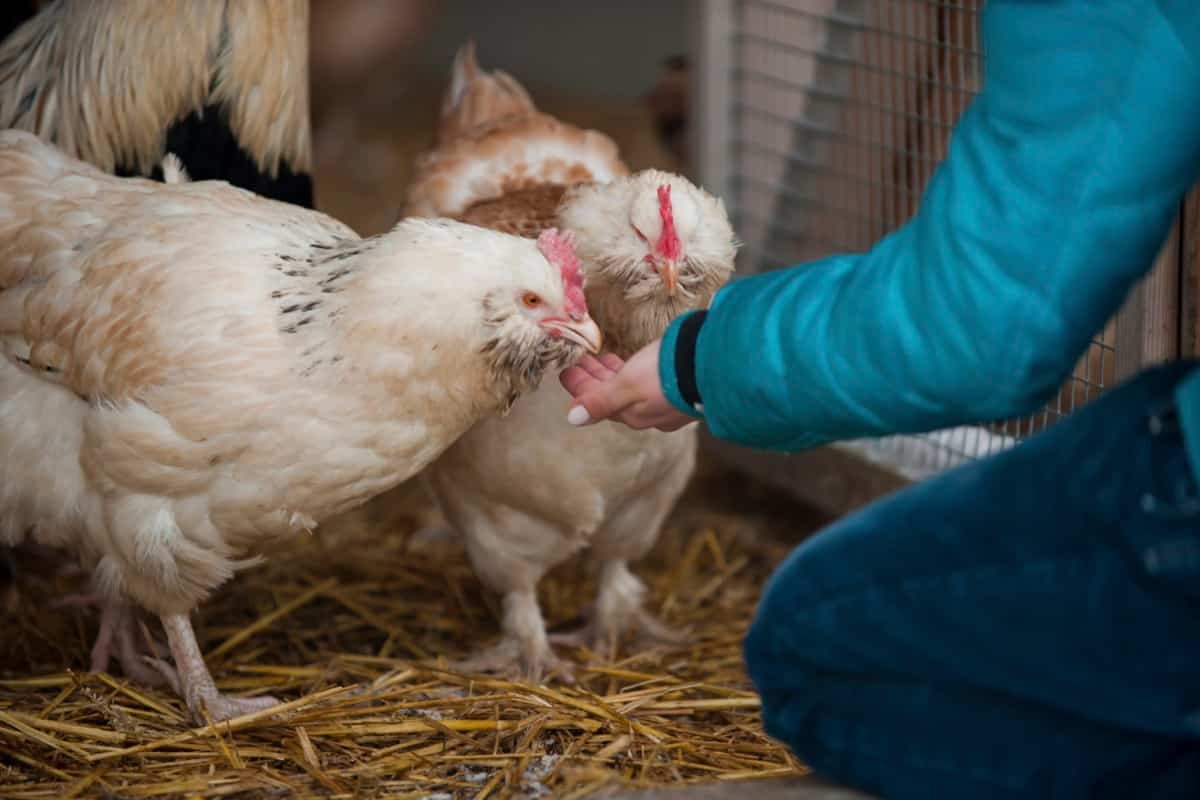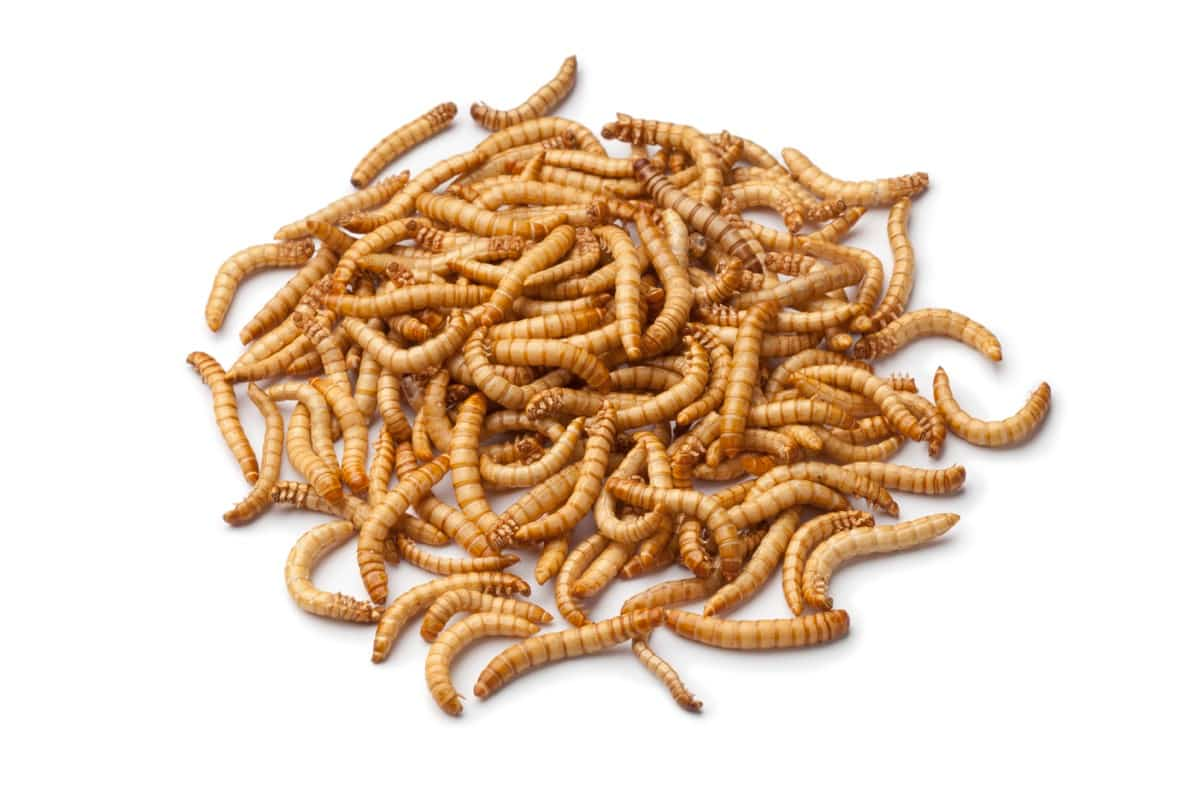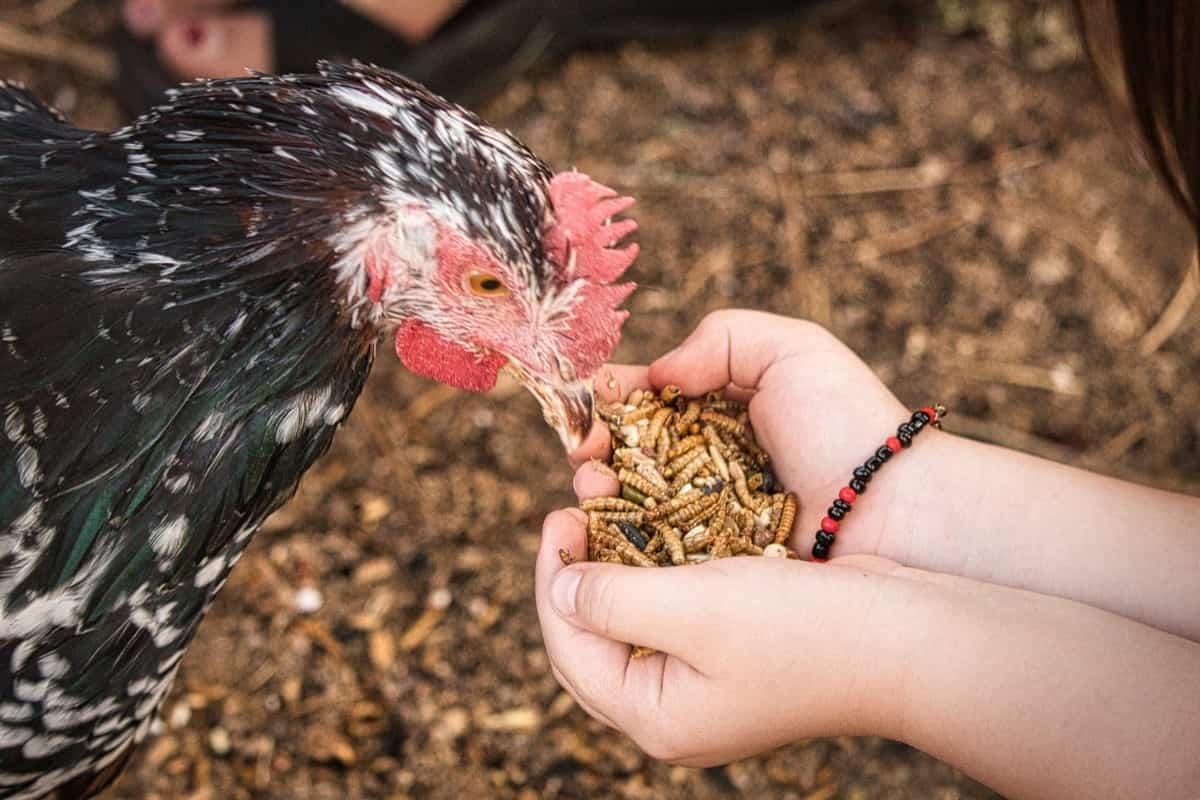In recent years, dried mealworms have gained popularity as supplementary feed for chickens. Besides providing your feathered friends with protein, they can also provide many health benefits. You should, however, understand the nutritional value, potential risks, and proper introduction of dried mealworms to your chickens’ diet before adding them to their diet. This article will explore whether dried mealworms are a good addition to your chicken’s diet.

Do Your Chickens Look Bedraggled or Have Low Energy?
They might suffer from a protein deficiency – after all, making all those eggs and producing feathers takes a lot of protein. Although chickens need a high-protein diet, many feeds contain only 15-18% of this essential nutrient. For free-range chickens or chickens that eat a lot of kitchen scraps, their protein intake is likely to be much lower than recommended.
How can chickens get the most protein from their diet? Of course, insects! There are various vitamins, minerals, and amino acids in bugs, making them a natural food source. The best way to feed your chickens is to feed them dried mealworms, which can either be raised yourself or purchased live worms with a short shelf life. You can’t go wrong with mealworms as a convenient, natural protein booster for your chickens.
How Many Mealworms Should Chickens Eat?
Feed your adult chicken 10-12 mealworms daily as a healthy protein supplement. You should double their mealworm intake during extreme weather conditions when breeding or showing and when they are molting. As a result, your hens will be able to cope with stress better.
7 Reasons to Feed Dried Mealworms for Chickens
Best Treats For Egg-Laying Chickens
A dried mealworm is considered one of the best treats for chickens that lay eggs. Providing these small, protein-rich snacks can benefit your flock’s health and productivity. Protein is abundant in dried mealworms. For chickens, especially those laying eggs, protein is essential. They benefit from it because it supports their overall health and provides the necessary nutrients for egg production. Adding dried mealworms to your chickens’ diet will ensure that they receive adequate protein.
Training Your Birds With Dried Mealworms
Positive reinforcement should be associated with the dried mealworms. When your birds exhibit the desired behavior, reward them with small pieces of the treats. As a result, they will be motivated to repeat the action in anticipation of the reward. For birds, positive reinforcement is the most effective training method.
Reward your bird with a dried mealworm when they perform the desired behavior. By associating the treat with the behavior, the bird will be motivated to repeat it in the future. To reinforce positive behavior, use a gentle tone during training sessions.
Dried Mealworms Are Good For Feathers
Birds require a balanced diet with essential nutrients to maintain healthy feathers. Protein is one of the most important nutrients for feather health. Keratin, a proteinaceous substance, is the primary component of feathers. The growth and maintenance of chicken feathers can be supported by consuming adequate protein.
A dried mealworm is an excellent dietary supplement for chickens since it contains a lot of protein. Vitamins and minerals in dried mealworms benefit birds’ health, including their feathers. They include vitamin E, which promotes healthy skin and feathers, and calcium, which makes feathers strong and durable. Try to alternate your chicken’s high-protein snacks – perhaps mealworms one day, hard-boiled eggs the next, and pumpkin seeds the third.
In case you missed it: 10 Simple Tips for Breeding Chickens: Guide to Successful Poultry Reproduction

Mealworms Used as Medicine
Mealworms are highly nutritious, providing chickens with essential proteins, fats, vitamins, and minerals. The tiny creatures provide chickens with all the essential amino acids that your chickens need to build and repair their body tissues. Chickens’ immune systems can be significantly improved by adding mealworms to their diets. As a result of antimicrobial peptides in mealworms, chickens are better able to fight off pathogens, reducing the likelihood of infection. It helps keep chickens healthy and productive by boosting their immune systems.
A Simple Treat of Mealworms
Chickens enjoy eating mealworms because they are nutritious and tasty. Chickens love these small, worm-like creatures because they are rich in protein. The process of feeding mealworms to chickens is relatively simple. They can be mixed with other feed or served as a standalone treat. Chicken owners sprinkle a handful of mealworms over their regular feed to provide a tasty surprise to their chickens.
Alternatively, mealworms can be offered separately as a training tool or a reward for good behavior. Make some mealworm ice cubes for a summer treat. Just a few can be put in the cube tray, sprinkled with herbs or grains, and frozen. For a while, the hens will enjoy pecking at those refreshing treats if you put them in the shade.
Increase Chickens Protein With Mealworms
When included in a chicken’s diet, mealworms are highly nutritious and offer several benefits. Compared to traditional feed sources, they contain 50-60% protein, significantly increasing protein content. Chickens need protein for muscle growth, feather development, and a healthy immune system.
Additionally, mealworms are a good source of essential amino acids, vitamins, and minerals. The high calcium content is essential to the formation of chicken eggshells and the development of chicken skeletons. In addition, mealworms provide omega-3 and omega-6 fatty acids, contributing to healthy feathers and a strong immune system. Protein content in live worms is slightly less problematic from a health perspective. If fed in moderation, dried ones aren’t harmful.
Tossing Mealworms In the Coop Keep Chickens Healthy and Active
Tossing mealworms into the coop can stimulate the chickens’ minds and prevent boredom. Foraging for food is one of the chickens’ favorite activities. They are naturally curious. The chickens are encouraged to explore their surroundings and engage in natural behaviors by scattering mealworms throughout the coop. As a result, behavioral issues such as feather picking and aggression can be prevented.
Physical activity will likely occur in chickens with access to mealworms in the coop. In addition to promoting exercise and overall fitness, tossing mealworms in different locations encourages chickens to move around. Finding and capturing mealworms mimics chickens’ natural foraging behavior, keeping them active and healthy.
In case you missed it: Mastering the Art of Chicken Training: How to Train Chickens to Return to Their Coop

Conclusion
Dried mealworms can be a valuable addition to your chickens’ diet, offering numerous nutritional benefits. However, it is important to use them as a portion of supplementary food, not a replacement for their regular feed. By sourcing quality dried mealworms and introducing them gradually, you can provide your chickens with a healthy and tasty treat that supports their overall well-being.
- Feed Your Flock for Less: Top 10 Tips to Save on Chicken Feed
- Ultimate Guide to Ossabaw Island Hog: Breeding, Raising, Diet, and Care
- Hatching Answers: The Top 10 Reasons Your Chickens Aren’t Laying Eggs
- Eggs and Economics: Breaking Down the Cost of Raising Backyard Chickens
- Defend Your Greens: Proven Methods to Keep Iguanas Out of Your Garden
- Ultimate Guide to Cinnamon Queen Chicken: A Comprehensive Guide for Beginners
- Ultimate Guide to California Tan Chicken: Breeding, Raising, Diet, Egg-Production and Care
- Ultimate Guide to Marsh Daisy Chicken: Breeding, Raising, Diet, and Care
- 10 Types of Chicken Farming Businesses You Can Start for Profits